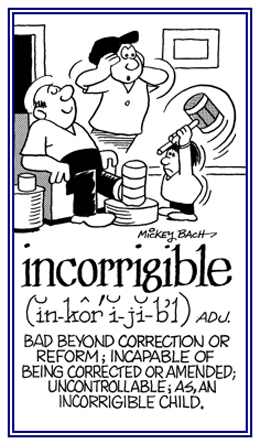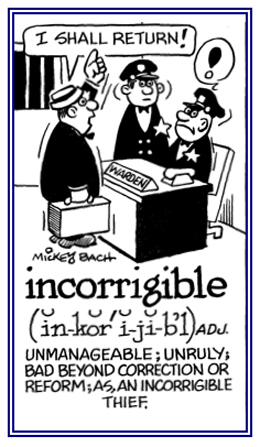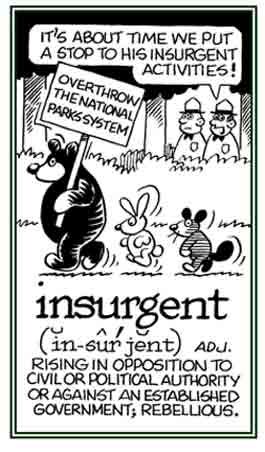erector
(i REK tuhr) (s) (noun), erectors
(pl)
Someone who assembles or fits together the separate component parts of buildings or other related property: All of the erectors, including the pipe fitters, welders, and steel assemblers, were necessary to put up the new city hall in Rodger's urban area.
hypercorrection
(s) (noun), hypercorrections
(pl)
A grammatical mistake, or mispronunciation, made by correcting something that is not actually wrong: A hypercorrection involves a sentence construction, or pronunciation, produced out of a desire to be "correct", as in the substitution of "I" for "me" with the mistaken belief that the following should be "On behalf of my parents and I", or "The secret is between you and I", instead of "The secret is between you and me".
incorrect
(adjective), more incorrect, most incorrect
1. A reference to wrong or inaccurate responses: Sometimes the details printed in the newspapers are incorrect and so it is known as "fake news", presenting the readers with inaccurate or false information.
2. Descriptive of inappropriate or improper behavior: Because of Jack’s incorrect conduct at school, his parents were called for a talk with the principal.
incorrectly
(in" kuh REKT li) (adverb), more incorrectly, most incorrectly
A reference to how something is done erroneously or wrong: Jim incorrectly wrote too many answers on the science test and so he got a grade of "F".
incorrectness
(s) (noun), incorrectnesses
(pl)
A situation in which there is a lack of truth or improper social behavior: Political incorrectness can be exemplified by actions which are perceived as insulting groups of people who are at a disadvantage or those who are discriminated against.
incorrigibility
(s) (noun) (no pl)
The condition of being incurable or a hopeless case; inability to be corrected or amended: The incorrigibility of Jack's habit of leaving his shoes and school things on the floor in the living room when coming home from school was nerve-wracking for his parents.
1. Regarding someone who is unmanageable and unable to be corrected or changed, even when punished; unruly: Stella was considered to be quite
incorrigible when not returning home at a certain set time, and so she wasn't allowed to go out with her friends for two weeks.
2. Referring to the incapability of being corrected or reformed: Tom was an
incorrigible criminal who seemed to spend most of his life in jail because of stealing.
3. Pertaining to someone who is difficult or impossible to control or to manage: Sally was an
incorrigible and spoiled child.
4. Etymology: from Old French
incorrigible, or directly from Latin
incorrigibilis, "not to be corrected"; from
in-, "not" +
corrigere, "to correct".
 © ALL rights are reserved.
© ALL rights are reserved.
 © ALL rights are reserved.
© ALL rights are reserved.
Go to this Word A Day Revisited Index
so you can see more of Mickey Bach's cartoons.
incorrigibly
(adverb), more incorrigibly, most incorrigibly
A reference to how someone is unable to be changed or to be reformed: After the sudden death of her mother, June was incorrigibly sad and distraught.
indirect
(adjective), more indirect, most indirect
1. Pertaining to something that has not clearly been mentioned or stated; implied; roundabout: Susan certainly did not go straight to the point of her visit, but kept mentioning the topic in the most indirect way.
2. Regarding an effect or result that has not been induced or created instantly, but happens as a consequence of another thing happening: As an indirect result of the military battle between the two countries, an uncountable number of people and animals die of starvation.
indirection
(s) (noun), indirections
(pl)
1. Aimlessness; devoid of a set way or method: After graduating from high school, Tom was in a state of indirection not knowing what he wanted to do next.
2. Stealth; slinkiness: The secret agent had to use indirection to keep his identity undisclosed.
indirectly
(adverb) (not comparable)
Regarding how something is presented in an unobvious manner: Jim's smoking caused him many health problems, and indirectly affected the others in his family.
insurgence
(s) (noun), insurgences
(pl)
The action or an instance of rebellion; an insurrection, revolt, anarchy; an organized rebellion: An insurgence can be aimed at overthrowing an existing government with the use of subversion and armed conflict.
insurgency
(s) (noun), insurgencies
(pl)
A condition of revolt against a recognized government that does not reach the proportions of an organized revolutionary government: An
insurgency is an organized rebellion aimed at overthrowing a constituted government through the use of subversion and armed conflict.
An insurgency, or insurrection, is an armed uprising, or revolt against an established civil or political authority.
People who are involved with an insurgency are called "insurgents", and they usually engage in regular or guerrilla combat against the armed forces of the established government, or conduct sabotage and harassment in the country with the purpose of undermining the government's leadership position.
An insurgency is not considered to be the same as a resistance both in its political overtones and in the nature of the conflict. An insurgency refers to an internal struggle against a standing and established government, however a resistance indicates a struggle against invading or occupying foreign forces and their collaborators.
A reference to a revolts against a recognized government that do not reach the degrees of an organized revolutionary government: The
insurgent uprising and attacks made by the rebels caused innumerable families to leave the area completely.
 © ALL rights are reserved.
© ALL rights are reserved.
Go to this Word A Day Revisited Index
so you can see more of Mickey Bach's cartoons.
insurgent
(s) (noun), insurgents
(pl)
A person or a group that rises in revolt against the leadership, a political party, or an established government or authority: The insurgents in the story James was reading were terrorists who used violence to frighten and intimidate the people in the town.
Cross references of word families related directly, or indirectly, to: "master, lead, leading, ruler, ruling, govern":
-agogic;
agon-;
arch-;
-crat;
dom-;
gov-;
magist-;
poten-;
tyran-.





